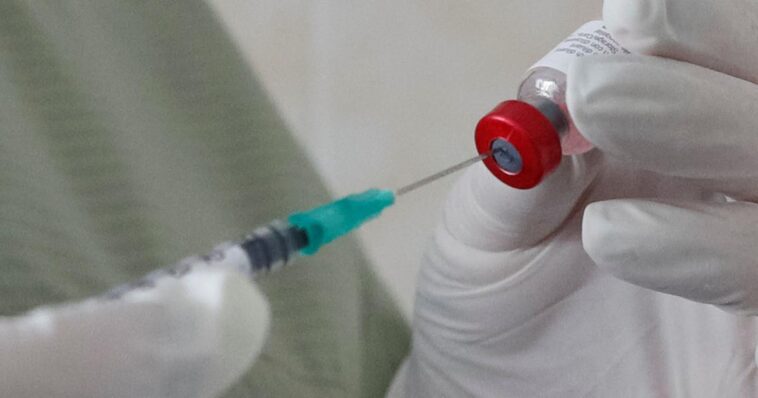Doctors are using this century-old vaccine
BCG has been recognised to cause an immune system state of general preparedness ever since it was first used to treat tuberculosis little over 100 years ago. Two new trials were added to the clinicaltrials.gov database in March 2020 as the UK was getting ready to fall into lockdown. The researchers suggested that Covid should be studied for its ability to defend against the old tuberculosis vaccine BCG.
Why did these researchers think BCG may have an impact on this radically different pathogen? Vaccines frequently trigger extremely precise immune responses against the disease they are intended to prevent.
In reality, BCG has been recognised to have “non-specific protective benefits” practically since its introduction as a treatment for tuberculosis just over 100 years ago. In other words, it is capable of preventing illnesses outside TB.
BCG, also known as Bacillus Calmette-Guérin, was created in France by two surgeons, Albert Calmette and Camille Guérin. The bacteria that causes tuberculosis in cattle was repeatedly grown (on potato slices) between 1908 and 1921 by Calmette and Guérin until it was no longer contagious to animals. It also defended these same animals when they were later confronted with Mycobacterium tuberculosis, the human counterpart.
With low adverse effects and high levels of protection against tuberculosis, BCG was administered to children within a few years. Data from trials in Sweden helped to partially substantiate Calmette’s 1931 hypothesis that BCG also decreased death from infectious diseases other than tuberculosis.
In spite of some instances of “healthy vaccinee bias” (those who are healthier are more likely to get vaccinated), a recent reanalysis of the Swedish data found that the findings did confirm a general protective effect of BCG. Later investigations and studies also shown that BCG has general preventive benefits against lung illnesses unrelated to tuberculosis.
The fact that BCG is a live microbe with a complex outer cell wall is crucial to its capacity to produce a general state of preparedness in the immune system, a phenomenon known as “trained immunity.” The immune system’s oldest (from an evolutionary standpoint) components, known as the innate response, are able to recognise specific components of this cell wall. This interaction trains innate immune cells to react to all microorganisms more efficiently.
vaccine for cancer
BCG has advantages beyond just treating infectious diseases. The use of living or dead bacteria as a cancer treatment was invented in the 19th century. Early in the 20th century, researchers began noticing how mycobacteria, in particular, affected cancer. This led to the development of BCG, which is administered directly to the bladder and is used to treat non-muscle invasive bladder cancer, in which the cancer cells are restricted to the bladder’s inner lining. It continues to be the accepted course of action for this kind of malignancy.
BCG immunotherapy trials have had varying degrees of success in treating other cancer forms. A lack of any benefit against general malignancies was noted in several investigations. Others proposed an impact on paediatric leukaemia or possibly a significant, long-term impact on lung cancer. Positive results have been seen when BCG is administered directly into melanoma lesions as opposed to the conventional upper arm injection, which has shown less success in treating melanoma.
The immune system uses many of the same tools that are successful against bacteria and viruses that enjoy living inside our cells to effectively attack cancer cells. Additionally, the trained immunity effect conferred by BCG activates these same weapons either directly or indirectly. BCG is “immunostimulatory,” in other words.
Therefore, it may come as a shock to learn that some of the non-specific protective benefits of BCG are effective against conditions when the immune system is overactive or mistakenly firing at the incorrect targets. Take type 1 diabetes and the autoimmune diseases multiple sclerosis as examples. In some instances, BCG is working in the other direction to depress the immune system.
According to studies, BCG can lessen and stop the immune system’s role in multiple sclerosis-related nerve damage. It can also fight off renegade immune cells that target diabetic patients’ pancreas’ ability to produce insulin. The power of BCG to boost populations of specific immune-dampening T-cells and its capacity to reprogramme cellular metabolism are thought to play critical roles in both type 1 diabetes and multiple sclerosis.
with addition to Covid
Also Read: | Syed Ata Hasnain | How Siachen obsession got better of Musharraf
And what about the Covid BCG vaccine? The picture is still ambiguous. An overall protective effect was not discovered in a recent meta-analysis, which combines and analyses data from several research. However, some success has been recorded in specific experiments. A decreased risk of Covid, for instance, six months following immunisation. Or, even more strikingly, a 92% efficacy in persons with long-term type 1 diabetes who received BCG for the purpose of preventing Covid.
It has long been recognised that BCG tends to offer varied protection. Its “day job” as a tuberculosis vaccine and its general protective benefits are both true of it. For this heterogeneity, a number of explanations have been put up. The immune system may react incorrectly to BCG if it has already been exposed to other microbes, such as bacteria from the same family as BCG or parasitic worms. Less successful immune responses to BCG may potentially be caused by variations in recipients’ genetic backgrounds.
It will undoubtedly be possible to use this most adaptable of vaccinations effectively in the future with a greater understanding of the conditions under which BCG operates most consistently to deliver its particular and non-specific effects.
Steven Smith teaches biomedical sciences as a senior lecturer at Brunel University London.
The Conversation is where this article first appeared.




